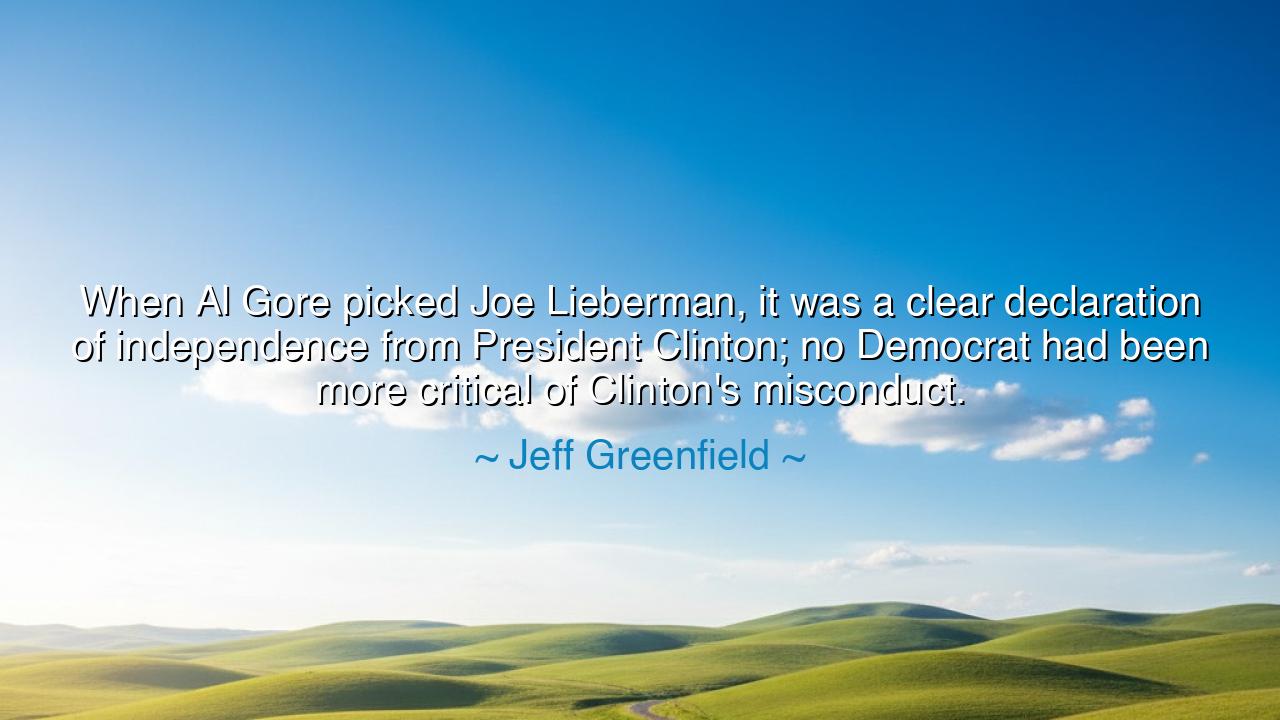
When Al Gore picked Joe Lieberman, it was a clear declaration of
When Al Gore picked Joe Lieberman, it was a clear declaration of independence from President Clinton; no Democrat had been more critical of Clinton's misconduct.






When Jeff Greenfield wrote, “When Al Gore picked Joe Lieberman, it was a clear declaration of independence from President Clinton; no Democrat had been more critical of Clinton's misconduct,” he was not merely describing a political strategy — he was capturing a moment of moral separation, a moment when a man sought to step out of another’s shadow to reclaim his own light. In those words lies a truth as old as leadership itself: there comes a time when every heir must distinguish himself from his predecessor, when loyalty must yield to integrity, and when silence must give way to conscience.
In the year 2000, the world watched as Al Gore, Vice President to Bill Clinton, stood at the crossroads of legacy and renewal. The years of prosperity under Clinton’s rule were marred by scandal — a moral wound that, though forgiven by law, had not been forgotten by the people. When Gore chose Joe Lieberman — a man known for his open criticism of Clinton’s moral failings — it was a symbolic act of purification. It was as if Gore had declared before the nation, “I will honor what was good, but I will not inherit what was flawed.” That decision was not simply political; it was a declaration of independence, a break from corruption and compromise.
Throughout the ages, we see the same struggle repeat. The apprentice must one day break from the master; the prince must step out of the king’s shadow. So it was when Octavian, the adopted son of Julius Caesar, rose not to continue the excesses of his predecessor but to reform the empire into something more enduring — the rule of Augustus. So it was when George Washington, though shaped by the British military tradition, cast off the crown’s authority to lead a nation of free men. Gore’s decision, in the realm of politics, mirrored these moments of rebirth — a reminder that true leadership is not imitation but transformation.
To understand Greenfield’s words is to see that independence is not rebellion, but renewal. It is not born of hatred for what came before, but of love for what must come next. By choosing Lieberman, Gore sought to restore a moral center to his campaign — to tell the people that power could be clean again, that governance could be grounded in conscience rather than charisma. In a time when loyalty often outweighs principle, that act spoke of courage. For to break from one’s benefactor, especially one as mighty as Clinton, is to risk exile from favor — yet to remain bound is to risk the death of one’s soul.
The ancients would have recognized this as the rite of purification before renewal. In every generation, there comes a moment when the disciple must prove that he can stand without the teacher’s hand. The Greeks told of Heracles cleansing himself after madness before becoming a god; the prophets of old withdrew to the wilderness before returning to lead. Gore’s “declaration of independence” was a modern echo of that eternal law: that before one can lead others, he must cleanse his own house of inherited sin.
But Greenfield’s quote carries a deeper lament, too — for it reminds us how rarely such courage is seen. In the age of politics and image, few are willing to distance themselves from power, even when that power is stained. The easy path is to remain silent, to inherit the mantle without questioning the moral debt that comes with it. Yet silence in the face of wrongdoing is its own form of betrayal. Gore’s act, whatever its political consequences, was an assertion that integrity still matters — that a nation built on ideals must be led by those who honor them.
So, my children of tomorrow, take this lesson to heart: there will come a day when you must choose between loyalty to comfort and loyalty to truth. Choose the latter. For every man or woman who walks the path of leadership must, at some hour, make a declaration of independence — not from rulers or parties, but from the shadows that dwell within their own past. When that moment comes, stand firm. Speak with courage. Purify your name with action, and your legacy with truth. For though the world may forget the politics of your time, it will never forget the honor of one who dared to stand apart.






AAdministratorAdministrator
Welcome, honored guests. Please leave a comment, we will respond soon